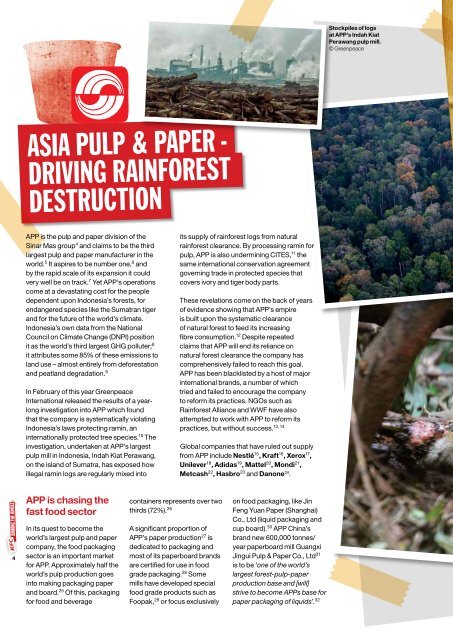Junking-the-Jungle - Greenpeace
Junking-the-Jungle - Greenpeace
Junking-the-Jungle - Greenpeace
Create successful ePaper yourself
Turn your PDF publications into a flip-book with our unique Google optimized e-Paper software.
4<br />
ASIA PULP & PAPER -<br />
DRIVING RAINFOREST<br />
DESTRUCTION<br />
APP is <strong>the</strong> pulp and paper division of <strong>the</strong><br />
Sinar Mas group 4 and claims to be <strong>the</strong> third<br />
largest pulp and paper manufacturer in <strong>the</strong><br />
world. 5 It aspires to be number one, 6 and<br />
by <strong>the</strong> rapid scale of its expansion it could<br />
very well be on track. 7 Yet APP’s operations<br />
come at a devastating cost for <strong>the</strong> people<br />
dependent upon Indonesia’s forests, for<br />
endangered species like <strong>the</strong> Sumatran tiger<br />
and for <strong>the</strong> future of <strong>the</strong> world’s climate.<br />
Indonesia’s own data from <strong>the</strong> National<br />
Council on Climate Change (DNPI) position<br />
it as <strong>the</strong> world’s third largest GHG polluter; 8<br />
it attributes some 85% of <strong>the</strong>se emissions to<br />
land use – almost entirely from deforestation<br />
and peatland degradation. 9<br />
In February of this year <strong>Greenpeace</strong><br />
International released <strong>the</strong> results of a yearlong<br />
investigation into APP which found<br />
that <strong>the</strong> company is systematically violating<br />
Indonesia’s laws protecting ramin, an<br />
internationally protected tree species. 10 The<br />
investigation, undertaken at APP’s largest<br />
pulp mill in Indonesia, Indah Kiat Perawang,<br />
on <strong>the</strong> island of Sumatra, has exposed how<br />
illegal ramin logs are regularly mixed into<br />
APP is chasing <strong>the</strong><br />
fast food sector<br />
In its quest to become <strong>the</strong><br />
world’s largest pulp and paper<br />
company, <strong>the</strong> food packaging<br />
sector is an important market<br />
for APP. Approximately half <strong>the</strong><br />
world’s pulp production goes<br />
into making packaging paper<br />
and board. 25 Of this, packaging<br />
for food and beverage<br />
containers represents over two<br />
thirds (72%). 26<br />
A significant proportion of<br />
APP’s paper production 27 is<br />
dedicated to packaging and<br />
most of its paperboard brands<br />
are certified for use in food<br />
grade packaging. 28 Some<br />
mills have developed special<br />
food grade products such as<br />
Foopak, 29 or focus exclusively<br />
its supply of rainforest logs from natural<br />
rainforest clearance. By processing ramin for<br />
pulp, APP is also undermining CITES, 11 <strong>the</strong><br />
same international conservation agreement<br />
governing trade in protected species that<br />
covers ivory and tiger body parts.<br />
These revelations come on <strong>the</strong> back of years<br />
of evidence showing that APP’s empire<br />
is built upon <strong>the</strong> systematic clearance<br />
of natural forest to feed its increasing<br />
fibre consumption. 12 Despite repeated<br />
claims that APP will end its reliance on<br />
natural forest clearance <strong>the</strong> company has<br />
comprehensively failed to reach this goal.<br />
APP has been blacklisted by a host of major<br />
international brands, a number of which<br />
tried and failed to encourage <strong>the</strong> company<br />
to reform its practices. NGOs such as<br />
Rainforest Alliance and WWF have also<br />
attempted to work with APP to reform its<br />
13, 14<br />
practices, but without success.<br />
Global companies that have ruled out supply<br />
from APP include Nestlé 15 , Kraft 16 , Xerox 17 ,<br />
Unilever 18 , Adidas 19 , Mattel 20 , Mondi 21 ,<br />
Metcash 22 , Hasbro 23 and Danone 24 .<br />
on food packaging, like Jin<br />
Feng Yuan Paper (Shanghai)<br />
Co., Ltd (liquid packaging and<br />
cup board). 30 APP China’s<br />
brand new 600,000 tonnes/<br />
year paperboard mill Guangxi<br />
Jingui Pulp & Paper Co., Ltd 31<br />
is to be ‘one of <strong>the</strong> world’s<br />
largest forest-pulp-paper<br />
production base and [will]<br />
strive to become APPs base for<br />
paper packaging of liquids’. 32<br />
Stockpiles of logs<br />
at APP’s Indah Kiat<br />
Perawang pulp mill.<br />
© <strong>Greenpeace</strong>

















